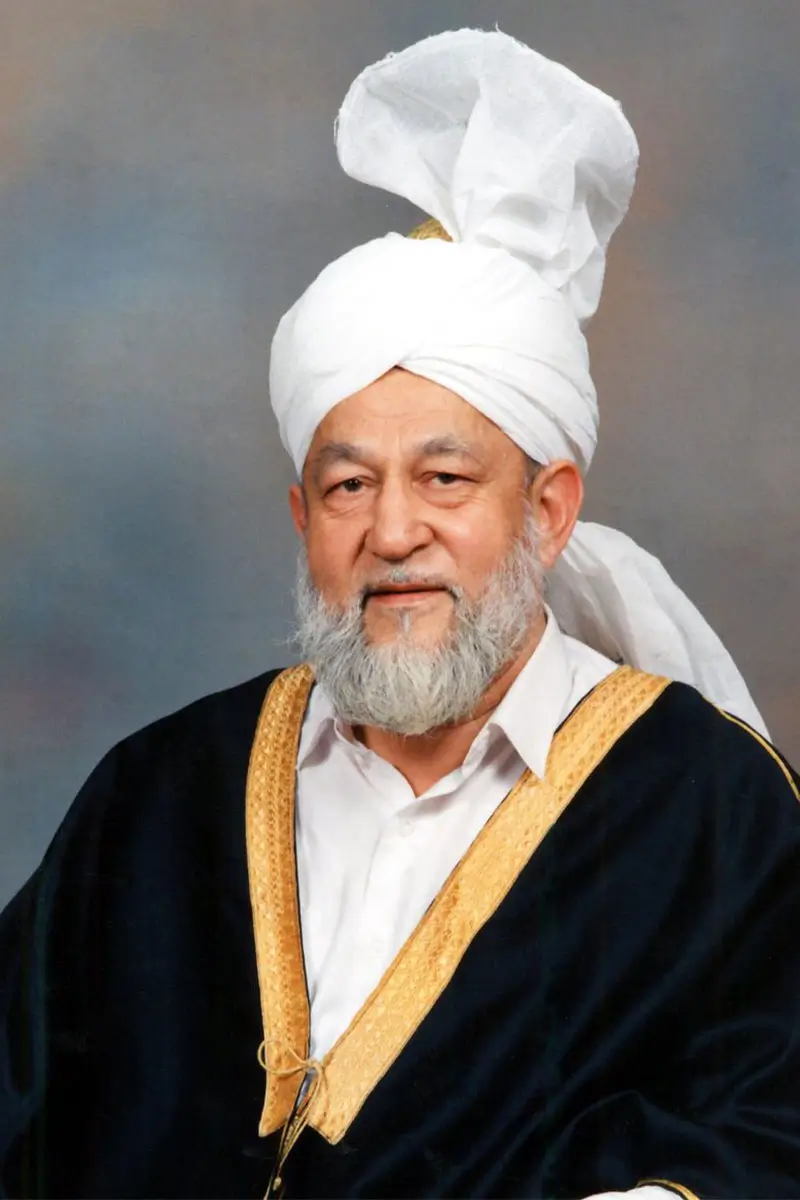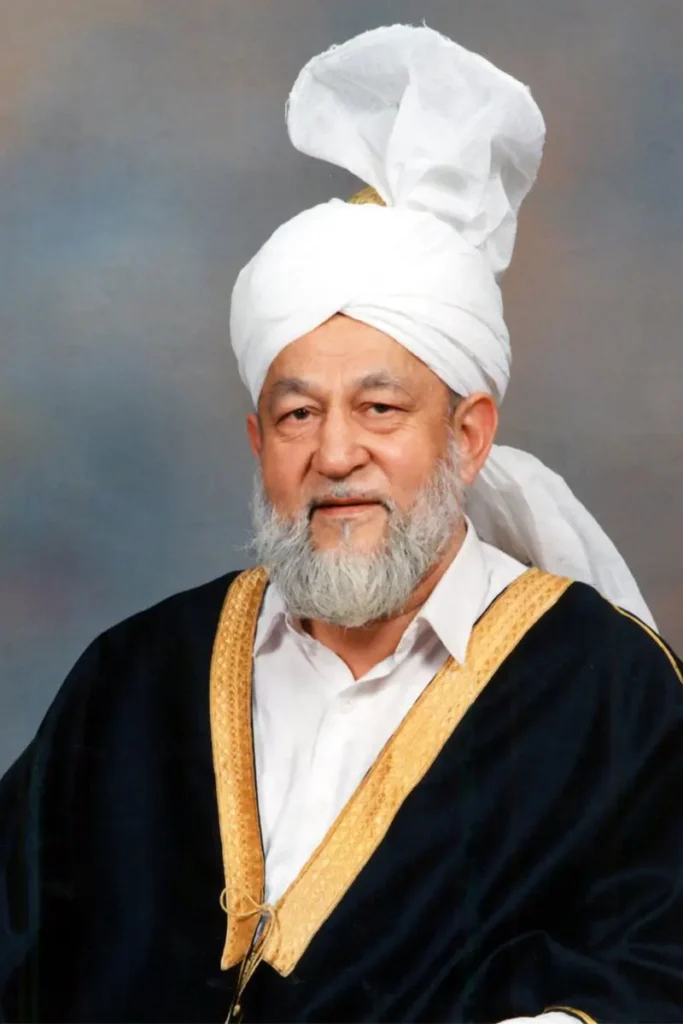Huzoor (rh): And the fact is that Hazrat Masih Maud A.S. (Promised Messiah) praised the British government for their justice, dispensation of justice and keeping a peace between religions by permitting them dialogue but not permitting them use of force against each other. This is in a nutshell what Hazrat Masih Maud A.S. has always been saying. And he praised the government for this, not for any personal reward which was ever given to him. In fact, the British government had taken away all the rural property of the family of Hazrat Masih Maud A.S. And in the same books where he praises them, he mentions that harsh treatment of the British government to his family. And he says that he himself has been representing the case of his father, he was fighting for the rights of his father because he compelled him to go to the courts and file cases because previously the family possessed rights over 70 villages. And they were all taken away, only 3 villages were left in the possession of the family. So Hazrat Masih Maud A.S. says that although he advised his father to turn his mind and heart towards Allah and leave these worldly things, they don’t matter, but he would insist, and he would not leave them. The result was that he was defeated in every case, he didn’t get anything and died a broken hearted man. This was the physical treatment of the British government to his family. And as far as the rewards are concerned, there is not a single penny which can be proved to have flown from the British government to his side. He never received any aid, any money whatsoever in any form. This is why the bitterest enemies of Ahmadiyya always claimed that he was a British agent but never produced evidence or a shadow of evidence. Even they don’t claim that we have any evidence. While the enemies who said that Hazrat Masih Maud A.S. was a British agent, they themselves were rewarded with lands and properties by the British government. So why Hazrat Masih Maud A.S. praised the British government, was just for the dispensation of justice. And he laid special stress on this, he said that the Muslims were in a bad plight. Now it is not because of what they did to the family that he is praising them. It is what they did to Islam, not to Jamaat-e-Ahmadiyya either. And he praises them in reference to their services to the cause of the Muslims in the subcontinent. He says that there was a time when the Muslims in the Punjab were treated by the Sikhs so maliciously and so cruelly that the life on earth for Muslims was a life in hell. They were deprived the rights of calling Azan as Ahmadis are now in Pakistan under Sikh Raj. They were stabbed to death if they called for the prayer like Ahmadis are being treated in Pakistan. They were deprived of their rights to worship Allah and all their properties were misappropriated and looted by the Sikhs as they pleased. So these were the cruelties from which the British relieved the Muslims and established a peace. And in that peace, a dialogue was, an atmosphere of dialogue was created because the British government would not permit anybody to fight his faith out. They permitted them to speak it out, to discuss it, to prove it rationally from the books and so on. So this was an atmosphere which was promotive to a larger and better understanding to human values and so on. So whenever Hazrat Masih Maud A.S. praised the British government, it was always in this reference. In no other reference. In one place, he praises them very highly and the mullahs take that passage out to deceive people that look here, this is their agent, otherwise why should he have praised the British government? While if you read on the same passage, you will find that he is praising them for rehabilitating a Muslim mosque to the Muslims which was occupied by the Hindus or the Sikhs and the Muslims were so weak that they could not get hold, get the possession of that mosque through their own strength. It was the justice of the British government that when they went to the court, they knew it was originally their mosque, so they rehabilitated it to the Muslims. That is not directly concerned with Ahmadis either. Just some Muslims in India are given a mosque and Hazrat Masih Maud A.S. is so grateful that he goes on praising that government. Now all this is based on the teachings of the Holy Quran, hal jasaul ihsan illal ihsan (is there a reward for good deeds other than good?). So he was following the Holy Quran, not these mullahs. We didn’t care what they did and what they said about him. He was just following the Holy Quran and the Holy Prophet of Islam. As far as the Holy Prophet of Islam peace be upon him goes, his sense of gratitude was so deep and so refined that you can’t find a single incident in the life histories of any great earthly man or even any great religious man to beat the incident which I am going to quote. With regards to his sense of gratitude to those people who have done good turn to others. Once after Jang-e-Hunain, when he fought the second battle against some tribes and Allah granted him victory over them, among them was the tribe of Hatim Tai. Now that Hatim Tai had done no turn, good turn to Hazrat Muhammad Mustafa s.a.w. because he was before his time, nor he ever did any showed any favour to his forefathers. But it was known that he was a kind man, he was kind to human beings as such and generous to them. So when those prisoners of war were brought before him who belonged to the tribe of Hatim Tai, not necessarily his direct descendants, Hazrat Muhammad Mustafa s.a.w. said that I leave my share of booty and slaves from this tribe because Hatim Tai was a great man and he used to do good turns to humanity, to the servants of Allah. All the Muslims said if you do it, we do also do it. All the prisoners were freed immediately there and then. This was the master of Hazrat Masih Maud a.s. This was his sense of gratitude. So he was his followers, not the followers of these worldly mullahs. He didn’t care what they said about him, but he followed in the footsteps of his master and his beloved, Hazrat Muhammad Mustafa s.a.w. which showed that whoever has been kind in some respects, despite the fact that they are your enemies, they had come to fight, they had come to kill, naturally they were enemies. Despite that fact, you in return should be kind to those who are kind to others even if remotely so, not directly to you. So this is the behavior of Hazrat Masih Maud a.s. These mullahs, they played a double game. That proved that they were totally dishonest. They wrote to the British government that this man claims to be the Mahdi and you know that Mahdi, the concept of Mahdi is a bloody Mahdi. He would take up the sword and destroy your empire. He would lead them to war against you. So when they complained to the British government that this is the type of man you are facing and this is on record, their applications, the British government became very cautious as to what was happening in Qadian. And to the people they said, he is a British agent. So he was brought to face difficulties from both sides by these enemies. To the government they said, he is your enemy. To the people he said, he is your enemy’s agent and he is working on his behalf. So there is honesty of purpose there. At one and the same time, in the same breath, they said both these things against Hazrat Masih Maud a.s.








